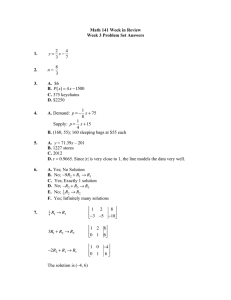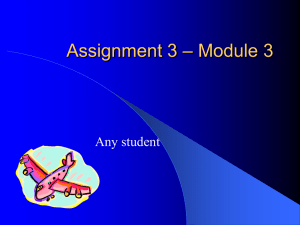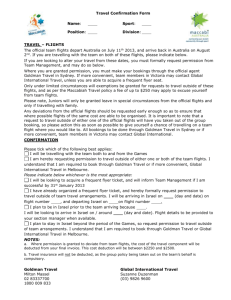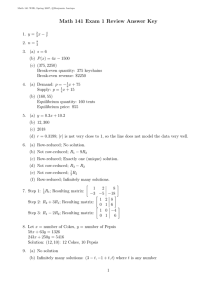幻灯片 1
advertisement
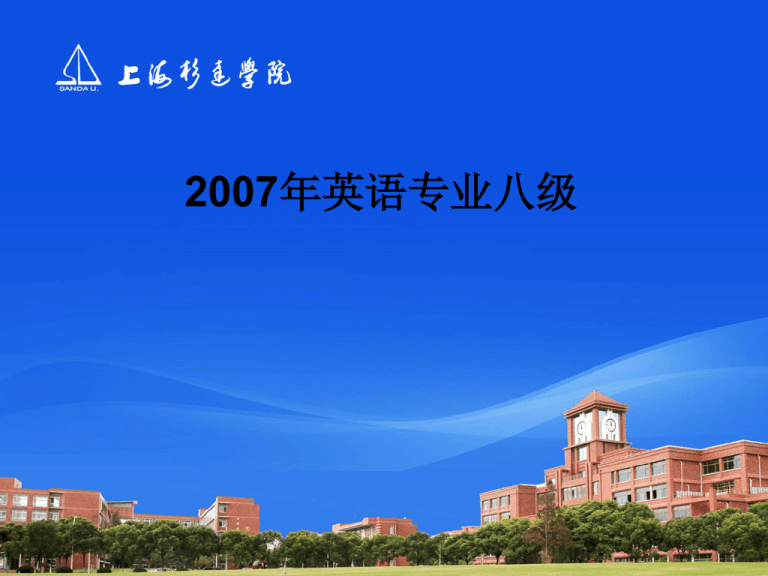
2007年英语专业八级 PART VI WRITING (45 MIN) (2008) In a few months’ time you are going to graduate from university. How do you think your college years have prepared you for your future life? Read the excerpts carefully and write your response in about 300 words, in which you should: 1. summarize briefly the opinions of each; 2. give your comment. Dong Li of Shanghai Teachers University: I am very proud that in university I have learnt how important it is for one to have vision, that ability to see ahead of time and possibly others. College has raised me up, so that I could enjoy a broader view of the world. University Library, the sanctuary of mind always keeps me in a close touch with the great thoughts of giants, Shakespeare, Russell, Churchill, Roosevelt, to name only a few. All these overwhelmingly famous names have turned familiar and friendly here. These great minds teach me how to live a meaningful life. They warn me that the last but greatest enemy for mankind is human existence itself. Their words of wisdom shall guide and guard me to overcome all the obstacles beset in the course of my life. In the light of this statement, I have to say that college years have brightened up my vision. Wu Pingping of Northeast China University: It is at university that I understood the meaning of mission i.e. man should have shoulders strong enough to take more responsibilities of the time. College years have enriched my life, so that I, to some extent, have discovered the truth to live by. When I was a sophomore, I became a volunteer for the Red Cross Institution. My job, then, was to assist the doctor with blood collection in a blood donation truck on the street. Those days bestowed me with a moving but a singular picture, in which the painful injection and hearty smile were perfectly and beautifully combined. Every parcel of blood means a piece of hope, through which I see that the possession of life lies in sharing. This is how college years defined my mission. He Gaojing of Sanda University: Three years ago, I chose English as my major. It seems to be a key to the door of my future. But the more English language I learnt, the less passion I had. Sometimes, I found it very hard for me, because I don't like it. However, I still tried my best to learn more and tried to pass the TEM-4. I hoped I could get good grades. Then, I learned how to develop my self-confidence. I believe everyone has his strength. We should find out and show it. I like dance. I was full of passion when I stood on the stage. So many people looked at me during the show and the sound of clapping made me feel happy. At the time, I recovered my self-confidence. . Lawrence H. Summers, former President of Harvard said in his farewell speech, “College graduates, capable of deep reflections are what the world needs.” Living in a world of madding crowd, a group, or even a small group of people are expected to remain transcendental and sober. If any can live up to so high a standard of existence, college graduates can. And I am fortunate in being among them at this moment and having spared little time cultivating my vision, mission and passion in the past four years. With these, I have better courage to change myself and most probably better preparation for my future. Writing: (2008) In a few months’ time we are going to graduate from university. How our college years have prepared us for our future life? Dong Li thinks that college years have broadened her horizon, teaching her how to live a meaningful life. Wu Pingping says that working as a volunteer for social work has enriched her life. He Gaojing believes that college years helped him regain his self-confidence. Lawrence H. Summers concludes that college years can help college graduates to change themselves and be better prepared for their future. I am fortunate in having cultivated my vision and attitude in the past four years.(103) First, _____ . Second, _____ . In a word, _____ . (200) What Can We Learn from Art? I. Introduction A. Differences between general history and art history — Focus: — general history: (1)_____ — art history: political values, emotions, everyday life, etc. B. Significance of study More information and better understanding of human society and civilization II. Types of information A. Information in history books is (2)_____ — facts, but no opinions B. Information in art history is subjective — (3)_____ and opinions e.g. — Spanish painter's works: misuse of governmental power — Mexican artists' works: attitudes towards social problems III. Art as a reflection of religious beliefs A. Europe: (4)_____ in pictures in churches B. Middle East: pictures of flowers and patterns in mosques, palaces Reason: human and (5)_____ are not seen as holy C. Africa and the Pacific Islands: masks, headdresses and costumes in special ceremonies Purpose: to seek the help of (6)_____ to protect crops, animals and people. IV. Perceptions of Art How people see art is related to their cultural background. A. Europeans and Americans — (7)_____ — expression of ideas B. People in other places — part of everyday life — (8)_____ use V. Art as a reflection of social changes A. Cause of changes: (9)_____ of different cultures. B. Changes — tribal people: effects of (10)_____ on art forms — European artists: influence of African traditional art in their works — American and Canadian artists: study of Japanese painting Part I Listening comprehension SECTION A MINI-LECTURE 1. POLITICS, ECONOMICS, WAR 2. OBJECTIVE 3. PERSONAL EMOTIONS/FEELINGS 4. THE BIBLE/BIBLE STORIES/PEOPLE AND STORIES 5. ANIMAL IMAGES 6. GOD/GODS/SPIRITUAL POWERS 7. DECORATION 8. FUNCTIONAL/PRACTICAL/DAILY 9. INFLUENCE 10. VALUES AND BELIEFS/URBANIZATION SECTION B INTERVIEW 1. A. Unfavorable weather conditions. B. Airports handling capacity. C. Inadequate ticketing service. D. Overbooking 2. A. Free ticket. B. Free phone call C. Cash reward D. Seat reservation 3. A. Because all flights in and out of there are full. B. Because the volume of traffic is heavy. C. Because there are more popular flights. D. Because there are more delays and cancellations. 4. A. Booking on less popular flights. B. Buying tickets at full price. C. Carrying excessive luggage. D. Planning long business trips. 5. A. The possibility of discounts depends on a travel agent’s volume of business. B. Longer flights to the same destination maybe cheaper. C. It is advisable to plan every detail of a trip in advance. D. Arranging for stopovers can avoid overnight travel. Questions: 1. According to Nigel, what caused most problems of air travel? A. Unfavorable weather conditions. B. Airports handling capacity. C. Inadequate ticketing service. D. Overbooking 2. Which of the following is NOT mentioned as compensation for volunteers for the next fight out? A. Free ticket. B. Free phone call C. Cash reward D. Seat reservation 3. Why does Niget suggest that business travelers avoid big airports? A. Because all flights in and out of there are full. B. Because the volume of traffic is heavy. C. Because there are more popular flights. D. Because there are more delays and cancellations. 4. Which of the following is NOT a likely mistake made by inexperienced travelers? A. Booking on less popular flights. B. Buying tickets at full price. C. Carrying excessive luggage. D. Planning long business trips. 5. Which of the following statements is INCORRECT? A. The possibility of discounts depends on a travel agent’s volume of business. B. Longer flights to the same destination maybe cheaper. C. It is advisable to plan every detail of a trip in advance. D. Arranging for stopovers can avoid overnight travel. Short-answer questions Text A: What point does Dyfan Jones make? Text B: What is the author’s attitude towards Kuwaiti’s democracy? Text C: What does “… pay a soldier’s death” mean? Text D: What does “I’ll-be-taken-care-of” in the last paragraph refer to? Listening: 1-5 BABAC 6-10 DCABC Part II Reading comprehension 11-15 CADBA 16-20 BADCD 21-25 DDDAA 26-30 DACBD Short-answer questions Text A: What point does Dyfan Jones make? They have gained confidence in their national identity. Text B: What is the author’s attitude towards Kuwaiti’s democracy? He is supportive but critical of its legislature. Text C: What does “… pay a soldier’s death” mean? One must face death bravely. Text D: What does “I’ll-be-taken-care-of” in the last paragraph refer to? It refers to promised economic security. Part III General Knowledge 31. C. 32. D 33. A 34. C 35. D 36.C 37. A 38. B 39. D 40. A SECTION B CHINESE TO ENGLISH Translate the underlined part of the following text into English. Write your translation on ANSWER SHEET THREE. 暮色中,河湾里落满云霞,与天际的颜色混合一起,分不清哪是流云哪是水湾。 也就在这一幅绚烂的图画旁边,在河湾之畔,一群羊正在低头觅食。它们几乎没有一个 顾得上抬起头来,看一眼这美丽的黄昏。也许它们要抓紧时间,在即将回家的最后一刻再 次咀嚼。这是黄河滩上的一幕。牧羊人不见了,他不知在何处歇息。只有这些生灵自由自 在地享受着这个黄昏。这儿水草肥美,让它们长得肥滚滚的。如果走近了,你会发现它们 洁白的牙齿,以及那丰富而单纯的表情。 如果稍稍长久一点端详这张张面庞,还会生出无限的怜悯。 汉译英 At dusk, the river bend is full of the reflections of rosy clouds which have merged with the clour of the sky on the horizon and are indistinguishable from the river bend. Just beside this splendid picture, a flock of sheep with their heads lowered are grazing by the riverside. Hardly does any of them care to look up and take a glance at this beautiful twilight. Perhaps they want to catch time for one more chewing before going home. This is a scene on the shore of the Yellow River. The shepherd is not in sight. Perhaps he is taking a rest somewhere. Only these living creatures are enjoying themselves at dusk. As there is sufficient water and rich grass here, sheep are all well-fed. If you walk up, you will see their snow-white teeth as well as rich and simple expressions. PART V WRITING [60MIN] Some people think that financial disparity affects friendship. What do you think? Read the excerpts carefully and write your response in about 300 words, in which you should: 1. summarize briefly the opinions of each; 2. give your comment. You should supply an appropriate title for your essay. Li Yinghua of Beijing Teachers University: It is hard for people of different financial backgrounds to share the same interests. Common interest is thought to be the basic bond between two friends, because a friend is someone we spend time together with and we do things together with. For example, a girl from a rich family will probably develop some “expensive” interests like piano-playing or ballet-dancing while a girl from a poor one may only be able to afford to enjoy some “cheap” hobbies like reading books or collecting stamps. Lin Shenghao of Durum University: Financial disparity makes mutual understanding difficult to reach between the rich and the poor. The economically superior ones will not understand why their friends do not want to go to the concert with them, why they prefer to dine at the dirty and noisy roadside restaurants, and why they like to wear the same clothes for several days. Besides, financial disparity will cause the feeling of being inferior and discriminated for the relatively poor one. Because of the disparity in financial matters, the relatively poor one will often live under great pressure and always feel inferior. As a result, their self-esteem is greatly hurt and the feeling of inequality grows. Without a feeling of equality, friendship is just like a castle in the air. Klontz, a clinical psychologist in Hawaii: In fact the “Money is evil” misconception is probably one of the most common attitudes that blocks money from many people. Usually, they have money connected with everything bad that is happening around the world – most wars are happening because of money, children in poor countries are dying because lack of money, and so on. They would probably have a lot of stories ready about people that became rich and how money ruined their lives by losing friends or partners as a result of it, how envy in the family broke the family apart and many other stories of that kind. In my opinion, it is not the money which is to be blamed for all of this – it is a wrong use of money by some of the people that have them. It is the people to be blamed for all of this, not the money itself. There are plenty of examples of a good use of money – look at charities for example and how much good they can do. All thanks to money they get from generous people. They have the power thanks to the money to change the world to the better. See how money helped during times of tragic world events, such as tsunami, earthquakes, and so on. Money is a power to make a difference.

